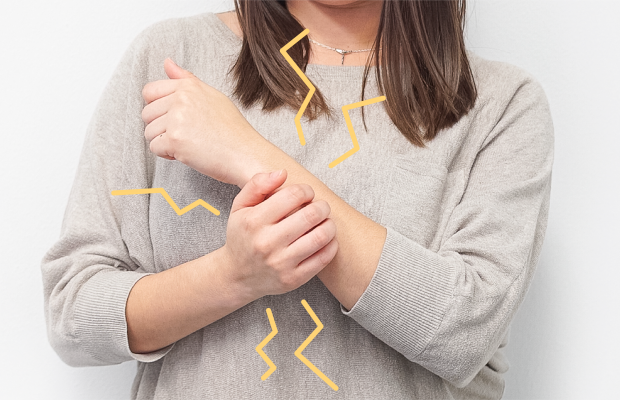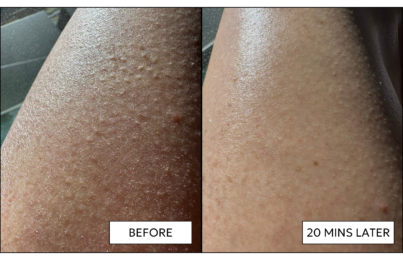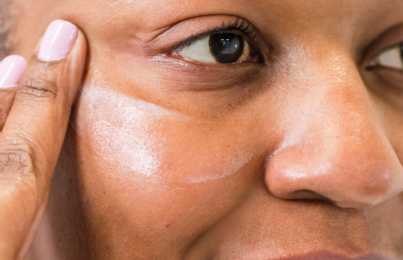Updated 12/11/23. Winter can wreak havoc on our skin. The harsh combination of cold temperatures and dry air can cause our skin to become dry and flaky. What might be worse, though, is the ongoing itchiness that’s often associated with it. It can be so tempting to scratch, but doing so can make the dryness worse and even harm your skin if you scratch hard enough.
- Why Does the Skin on My Body Get So Dry and Itchy in Winter?
- 8 Expert Tips to Get Rid of Dry, Itchy Body Skin
- 1. Avoid Using Drying Bar Soaps and High-Foaming Body Washes
- 2. Use a Humidifier
- 3. Gently Exfoliate Twice a Week
- 4. Apply Body Lotion or Body Oil Morning and Night
- 5. Avoid Tight-Fitting Clothing With Scratchy Fibers
- 6. Avoid Using the Shower Fan
- 7. Eat Foods that Contain “Good Fats”
- 8. If All Else Fails, Apply a Cortisone Cream
In an effort to resolve this condition, many people apply heavy body lotion, but doing this alone won’t get rid of it. In this post, I’ll share my expert tips for fixing dryness and itchiness, fast. Keep reading to find out how to soothe and relieve your skin, plus learn why your skin gets so dry and itchy in the first place!
Why Does the Skin on My Body Get So Dry and Itchy in Winter?
Your skin has a moisture barrier that’s made up of natural lipids that keep moisture in and irritants out. When this barrier is damaged, it creates tiny, invisible cracks in the skin that allow moisture to escape, resulting in visible flakiness. This happens for multiple reasons, some of which include age, using drying skincare products, genetics (and more specifically a mutation in the filaggrin gene), and low humidity environments, and cold winter air.
Because of these tiny cracks in the skin, irritants like friction from scratchy clothing, heavily perfumed lotions, and overly-abrasive body scrubs can stimulate nerve endings and cause the skin to feel sensitive and itchy. So, the best way to fix this condition is to fix your moisture barrier. Here are my 8 expert tips to help you do just that.
8 Expert Tips to Get Rid of Dry, Itchy Body Skin
1. Avoid Using Drying Bar Soaps and High-Foaming Body Washes
The body has far fewer oil glands than the face. To make matters worse, the ones that you do have decrease with age. Since bar soaps and high-foaming body washes usually have a high pH, they can strip the skin of moisture, making dryness and itchiness worse.
Instead of using these types of cleansers, use a non-drying, low-foaming shower gel. Look for one that has a creamy consistency and says ‘sulfate-free’ on the bottle. Avoid those that contain ingredients like Sodium Lauryl Sulfate or Ammonium Lauryl Sulfate, as these can further damage the skin’s moisture barrier.
2. Use a Humidifier
When the air is dry, it draws moisture from anywhere it can find it (through a process called osmosis). Especially in the winter, when the air is particularly dry, it will take it directly from your skin. Using a humidifier is an easy way to counteract this.
Whenever the air is dry and moisture is not present, the air draws moisture from wherever it can (through a process called osmosis). Especially in the winter, it will take it directly from your skin. Using a humidifier helps counteract the dryness in the air so moisture is less likely to evaporate from your skin. (Here are five other reasons to use a humidifier in the winter.)
3. Gently Exfoliate Twice a Week
Gently removing dry, flaky cells on the surface of the skin will not only make the skin look smoother and feel softer, but it will help body lotion and body oil penetrate deeper and work more effectively. Trust me—removing expired cells is one of the best things you can do to alleviate dryness and itchiness, so long you immediately apply a good body lotion or body oil on the fresh skin.
Options for Exfoliating Dry, Itchy Body Skin
- Use a gentle body scrub. Avoid those that are too harsh or use large exfoliating granules (like salt scrubs), as these could further irritate your skin.
- Massage a dry body brush over your skin before showering.
- Use an exfoliating peel pad, like DERMAdoctor KP Duty Peel Pads.
- Use an exfoliating body lotion. I recommend the DERMAdoctor KP Duty Lotion.
- Give yourself an at-home leg facial for silky smooth skin in just 20 minutes. It’s effective for addressing bumps caused by keratosis pilaris!
4. Apply Body Lotion or Body Oil Morning and Night
When used in conjunction with these other steps, body lotion and body oil can help moisturize the skin and support the moisture barrier. I personally like to apply body lotion and then apply body oil over top. This provides a protective seal so moisture will have a really hard time escaping.
Not all moisturizing ingredients are equal. That’s why it’s important to choose a body lotion and/or body oil that contains barrier-supporting ingredients. Look for those that contain some of the ingredients listed below, as these are the most effective for fixing dry, itchy body skin.
- Borage Oil
- Bois De Rose Oil
- Carrot Oil
- Evening Primrose Oil
- Cranberry Oil
- Ceramides
- Linoleic/Linolenic Acids
- Squalane
- Tocopheryl Linoleate
- Phytosterols
- Shea Butter
- Sunflower Oil
- Soybean Oil
- Safflower Oil
- Jojoba Oil
- Sweet Almond Oil
- Canola Oil
- Sesame Seed Oil
5. Avoid Tight-Fitting Clothing With Scratchy Fibers
Fabrics like wool can add to skin irritation so it’s best to wear smooth fabrics like cotton or silk next to the skin. I know for me, itchiness occurs on my hips where my clothes are the tightest. The rubbing when I move around adds to the irritation and causes my skin to itch like crazy in the winter. Even though I don’t have visible dryness in this area, it’s still a sign of a damaged moisture barrier, so I have to treat it with regular exfoliation and moisture.
6. Avoid Using the Shower Fan
During the winter, when the heat is on in the house, it can create an exceptionally dry environment. And as I said before, dry air will seek moisture wherever it can find it.
After taking a warm shower or bath, the moisture collects and hangs in the air. Running the bathroom fan eliminates this steam, which means it’s not able to keep your skin comfortably hydrated. That’s why I recommend turning the shower fan off to encourage moisture to remain in the air. Be sure to apply a body lotion or body oil immediately after you get out of the shower to seal that moisture into your skin.
7. Eat Foods that Contain “Good Fats”
While topical skincare is the key to alleviating dry, itchy body skin, a healthy diet can promote skin health from the inside out (it’s all connected after all!). Almonds, salmon, sardines, avocados, walnuts, and olive oil all contain fatty acids that can help keep the skin moist. If your skin is exceptionally dry and itchy, consider taking an evening primrose supplement, which can offer additional comfort. Just be sure to consult your doctor first.
8. If All Else Fails, Apply a Cortisone Cream
For itchiness, applying a non-prescription, topical 1% cortisone cream in place of body lotion can provide anti-inflammatory relief. You can also mix this in with a body lotion before applying it to the skin.
In summary, if you’re really consistent with exfoliating and using well-formulated lotions or oils, along with taking my other suggestions into account, you should be able to dramatically reduce dryness, flakiness, and itchiness. If not, I suggest consulting a board-certified dermatologist.
Next, here are the top five winter skin mistakes to avoid making!
Celebrity Esthetician & Skincare Expert
As an esthetician trained in cosmetic chemistry, Renée Rouleau has spent 35 years researching skin, educating her audience, and building an award-winning line of products. Her hands-on experience as an esthetician and trusted skin care expert has created a real-world solution — products that are formulated for nine different types of skin so your face will get exactly what it needs to look and feel its best. Trusted by celebrities, editors, bloggers, and skincare obsessives around the globe, her vast real-world knowledge and constant research are why Marie Claire calls her “the most passionate skin practitioner we know.”




Comments:
I get terrible itching after exfoliating. It doesn’t matter which metric I try. I would love to be able to body brush daily but the 15 mins itching after is awful. Will this subside if I persevere and get the condition of my skin u see control ?
Posted By: Summer |
If your skin isn’t responding well to dry brushing, this may not be the best option for you. It could be a lot of different factors (you may be sensitive or allergic to the material of the brush or it could just be too harsh an exfoliating method for you). I suggest trying a different kind of exfoliation, maybe a gentle body scrub or even chemical exfoliator. Hope this helps!
Posted By: Renée Rouleau |
Great tips! On random days, I am suffer from terrible itch. What moisturizing cream/lotion do you recommend?
Posted By: Baby Eczema Relief |
Hi there! Look for an unscented body lotion that contains one or more of the barrier-repairing ingredients listed in this blog post.
Posted By: Renée Rouleau |